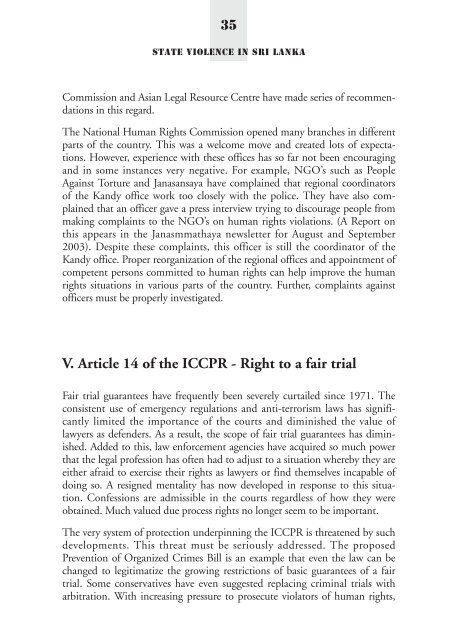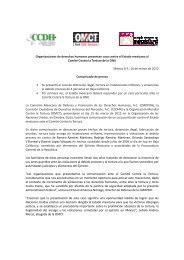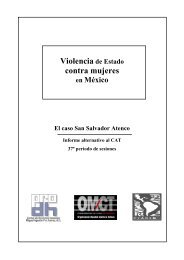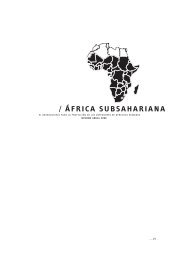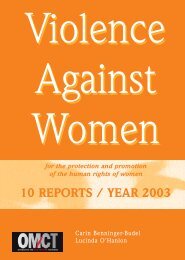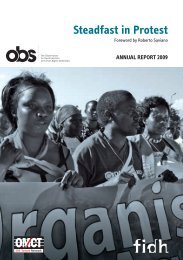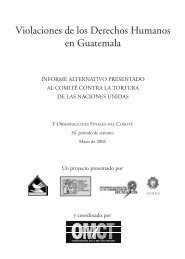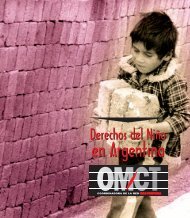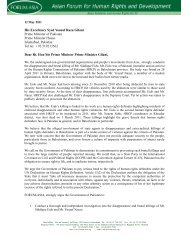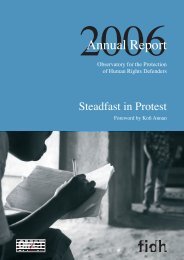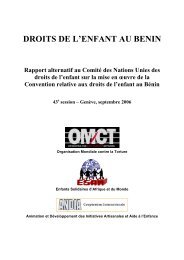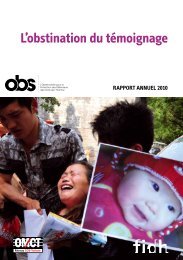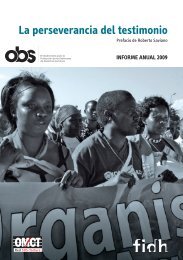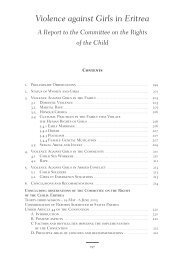State Violence in Sri Lanka - World Organisation Against Torture
State Violence in Sri Lanka - World Organisation Against Torture
State Violence in Sri Lanka - World Organisation Against Torture
Create successful ePaper yourself
Turn your PDF publications into a flip-book with our unique Google optimized e-Paper software.
35<br />
<strong>State</strong> <strong>Violence</strong> <strong>in</strong> SRI LANKA<br />
Commission and Asian Legal Resource Centre have made series of recommendations<br />
<strong>in</strong> this regard.<br />
The National Human Rights Commission opened many branches <strong>in</strong> different<br />
parts of the country. This was a welcome move and created lots of expectations.<br />
However, experience with these offices has so far not been encourag<strong>in</strong>g<br />
and <strong>in</strong> some <strong>in</strong>stances very negative. For example, NGO’s such as People<br />
Aga<strong>in</strong>st <strong>Torture</strong> and Janasansaya have compla<strong>in</strong>ed that regional coord<strong>in</strong>ators<br />
of the Kandy office work too closely with the police. They have also compla<strong>in</strong>ed<br />
that an officer gave a press <strong>in</strong>terview try<strong>in</strong>g to discourage people from<br />
mak<strong>in</strong>g compla<strong>in</strong>ts to the NGO’s on human rights violations. (A Report on<br />
this appears <strong>in</strong> the Janasmmathaya newsletter for August and September<br />
2003). Despite these compla<strong>in</strong>ts, this officer is still the coord<strong>in</strong>ator of the<br />
Kandy office. Proper reorganization of the regional offices and appo<strong>in</strong>tment of<br />
competent persons committed to human rights can help improve the human<br />
rights situations <strong>in</strong> various parts of the country. Further, compla<strong>in</strong>ts aga<strong>in</strong>st<br />
officers must be properly <strong>in</strong>vestigated.<br />
V. Article 14 of the ICCPR - Right to a fair trial<br />
Fair trial guarantees have frequently been severely curtailed s<strong>in</strong>ce 1971. The<br />
consistent use of emergency regulations and anti-terrorism laws has significantly<br />
limited the importance of the courts and dim<strong>in</strong>ished the value of<br />
lawyers as defenders. As a result, the scope of fair trial guarantees has dim<strong>in</strong>ished.<br />
Added to this, law enforcement agencies have acquired so much power<br />
that the legal profession has often had to adjust to a situation whereby they are<br />
either afraid to exercise their rights as lawyers or f<strong>in</strong>d themselves <strong>in</strong>capable of<br />
do<strong>in</strong>g so. A resigned mentality has now developed <strong>in</strong> response to this situation.<br />
Confessions are admissible <strong>in</strong> the courts regardless of how they were<br />
obta<strong>in</strong>ed. Much valued due process rights no longer seem to be important.<br />
The very system of protection underp<strong>in</strong>n<strong>in</strong>g the ICCPR is threatened by such<br />
developments. This threat must be seriously addressed. The proposed<br />
Prevention of Organized Crimes Bill is an example that even the law can be<br />
changed to legitimatize the grow<strong>in</strong>g restrictions of basic guarantees of a fair<br />
trial. Some conservatives have even suggested replac<strong>in</strong>g crim<strong>in</strong>al trials with<br />
arbitration. With <strong>in</strong>creas<strong>in</strong>g pressure to prosecute violators of human rights,


